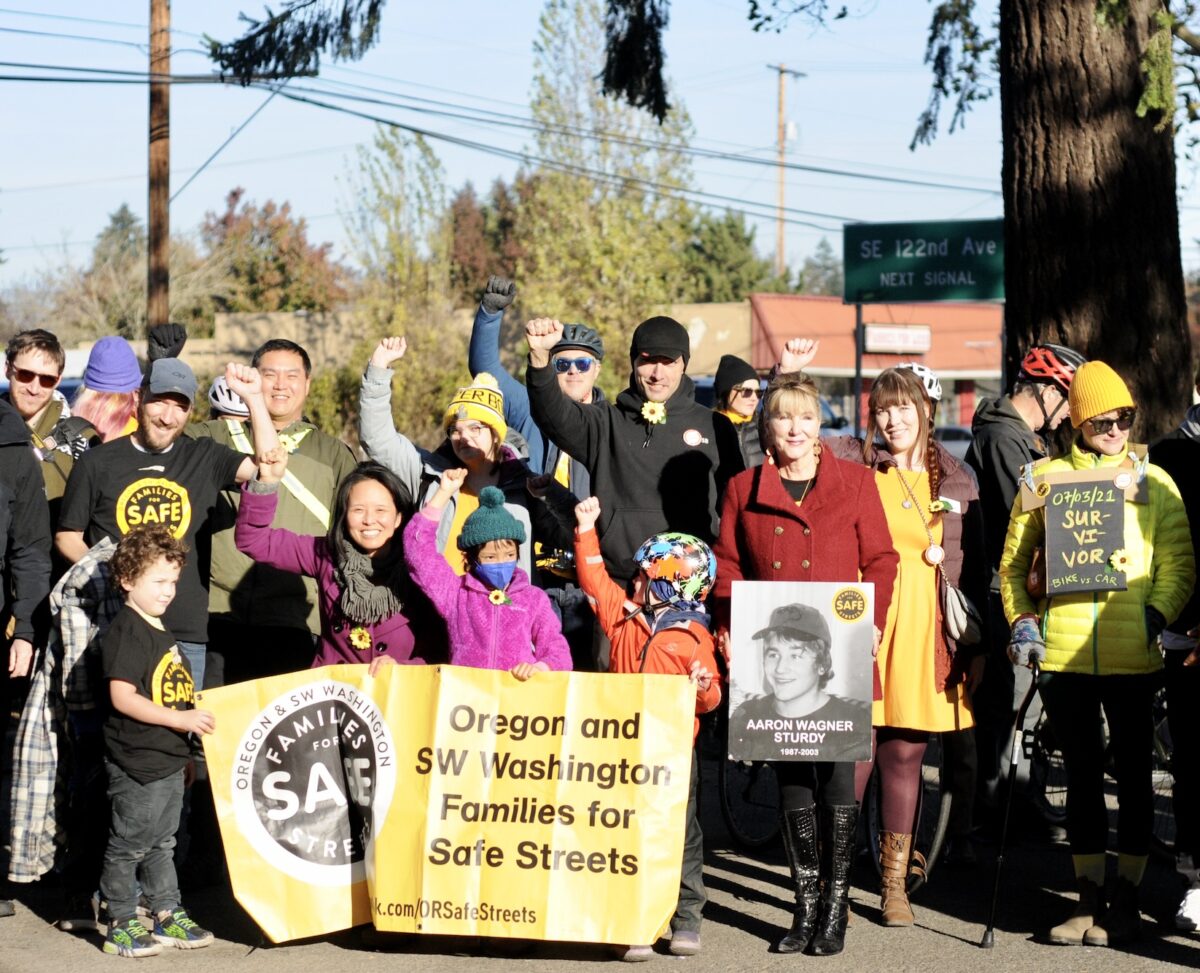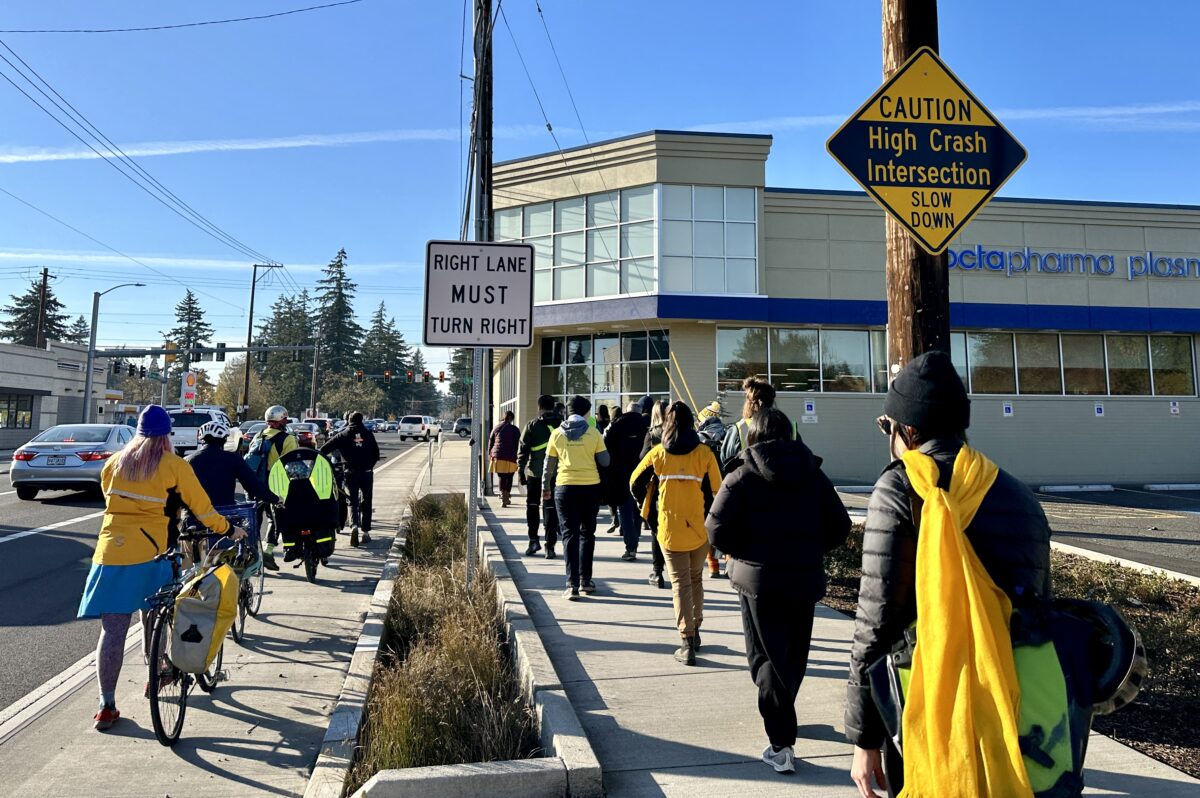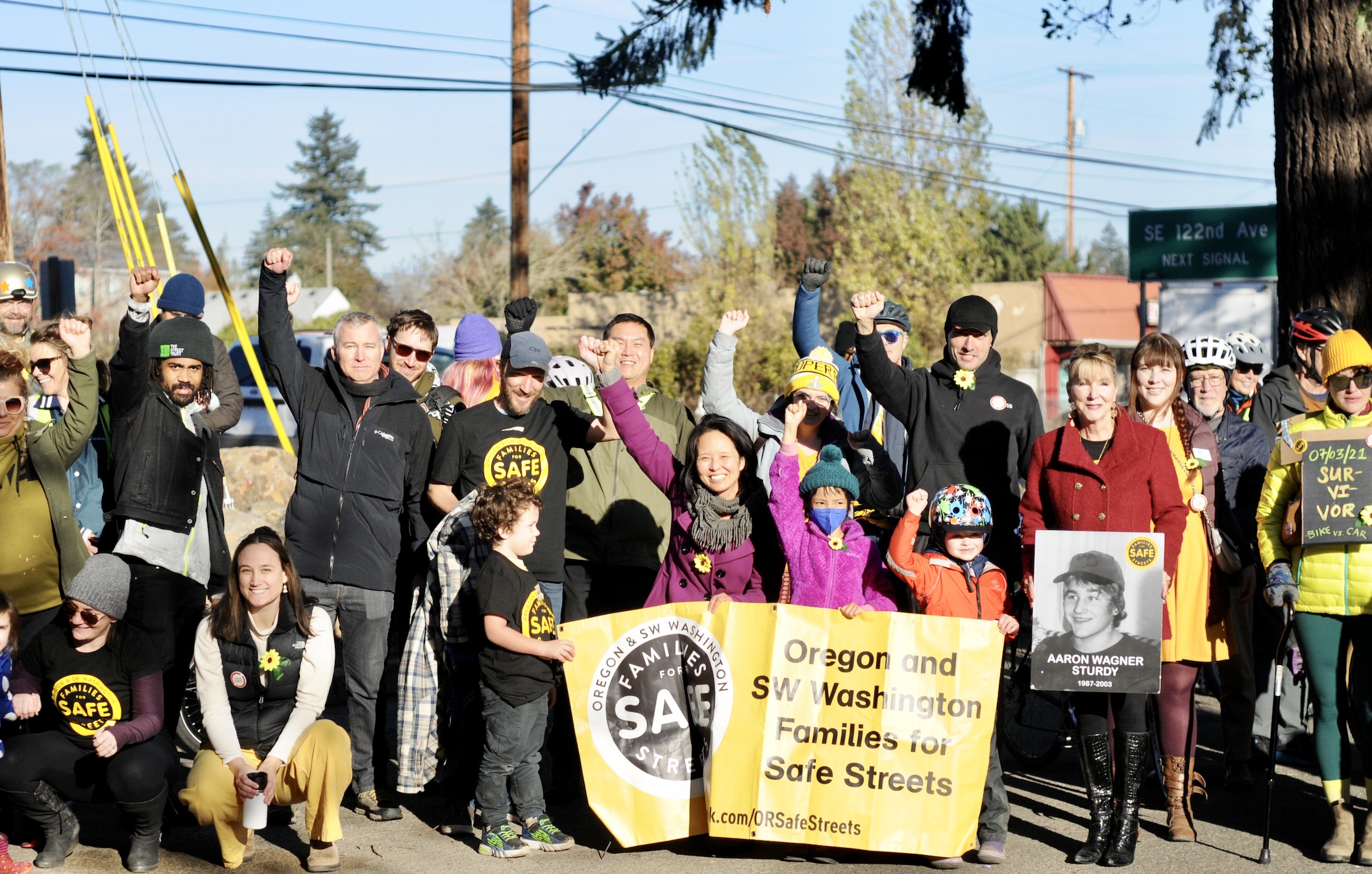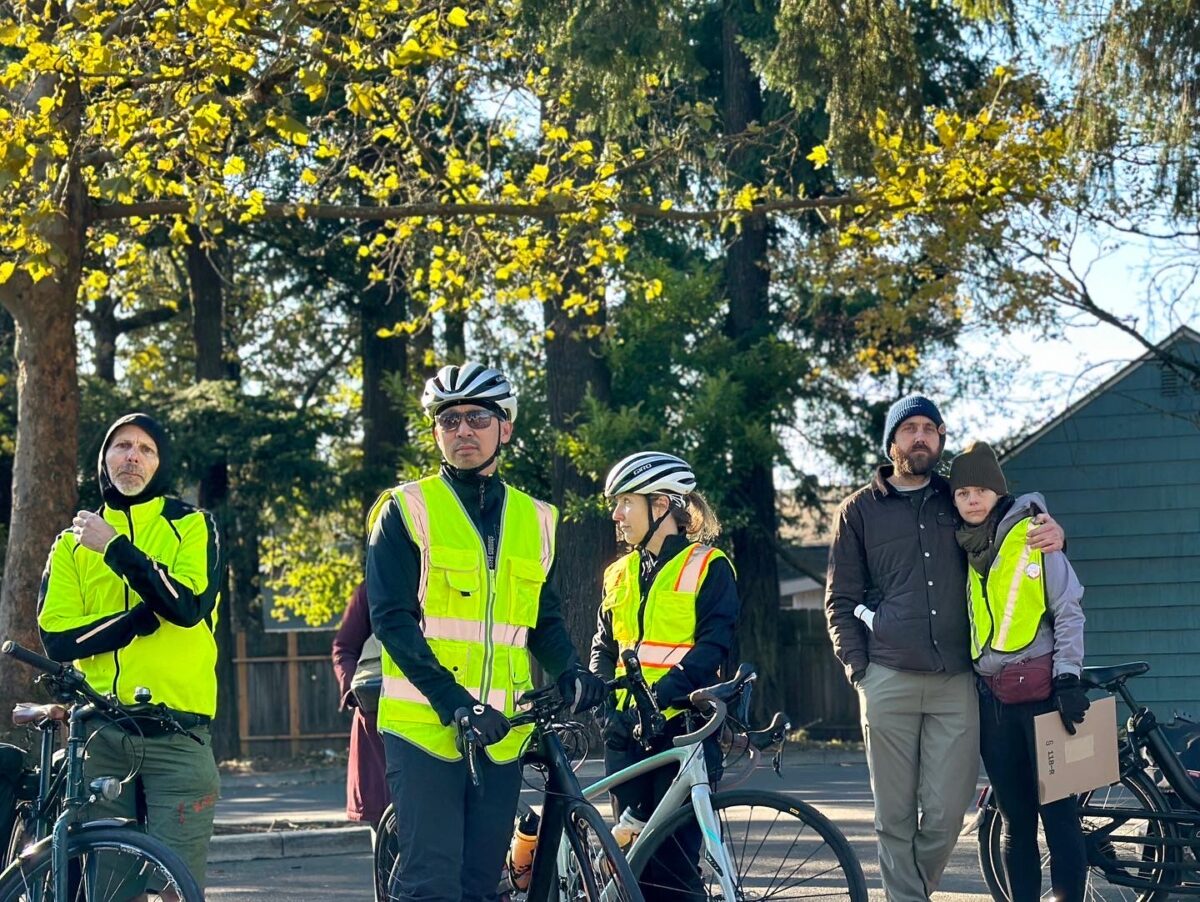

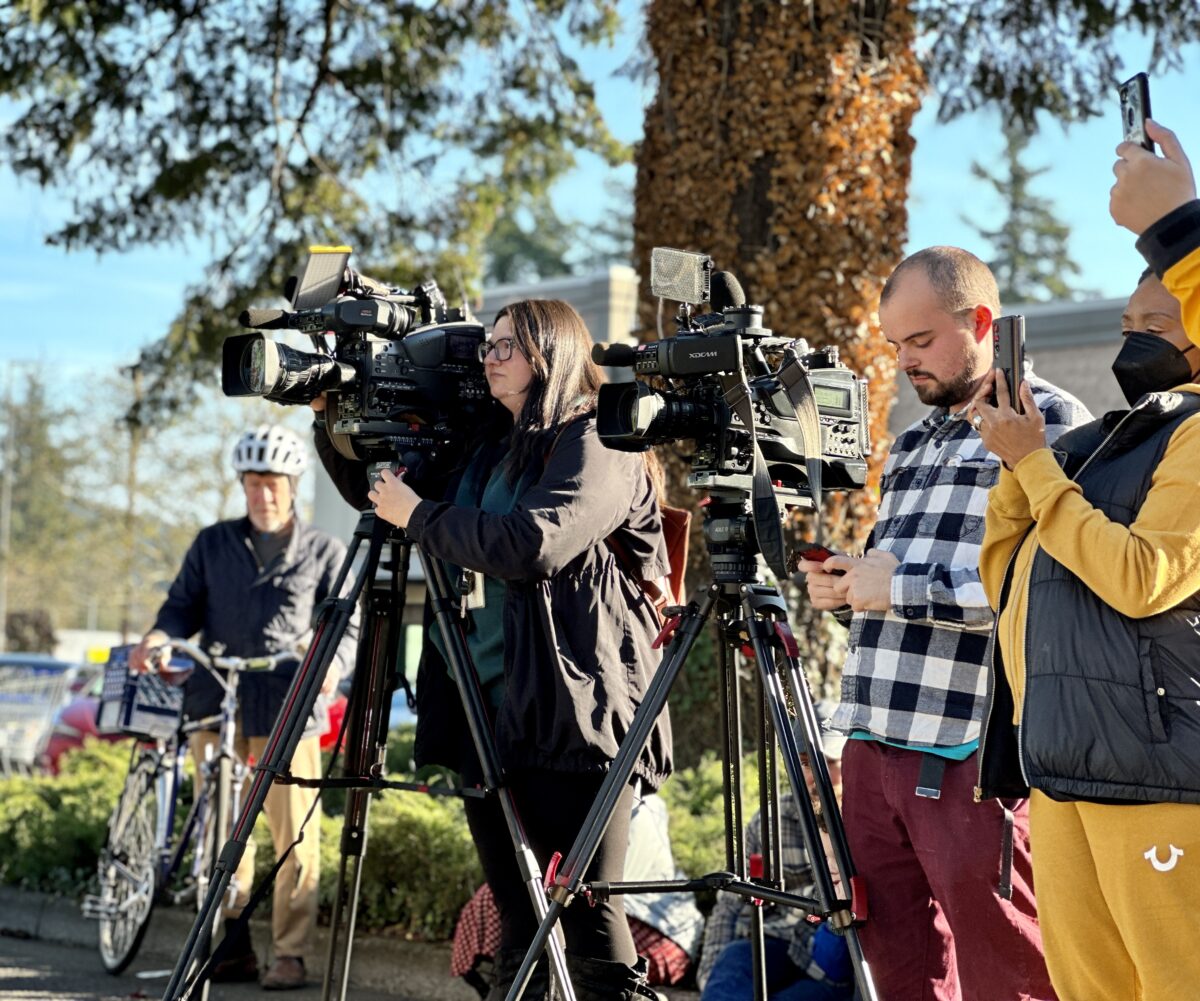
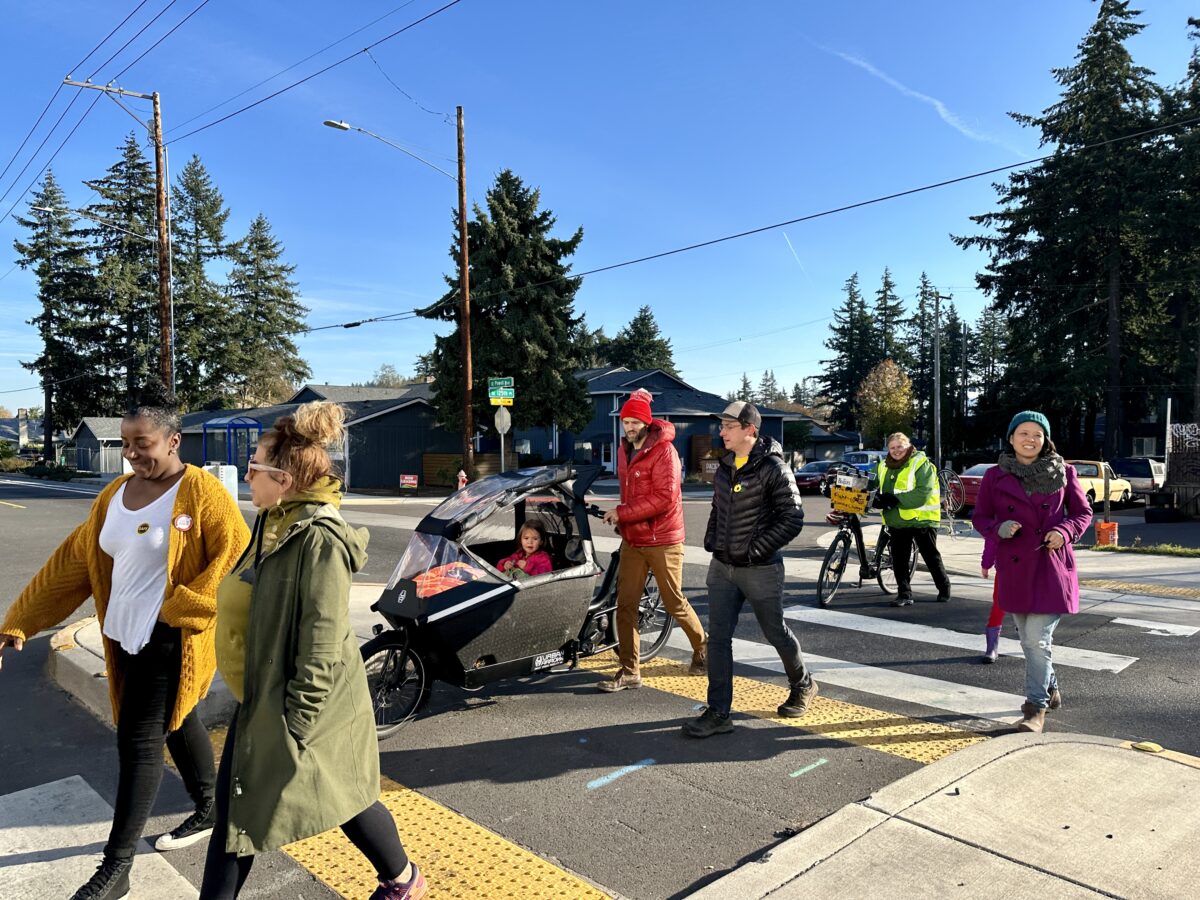

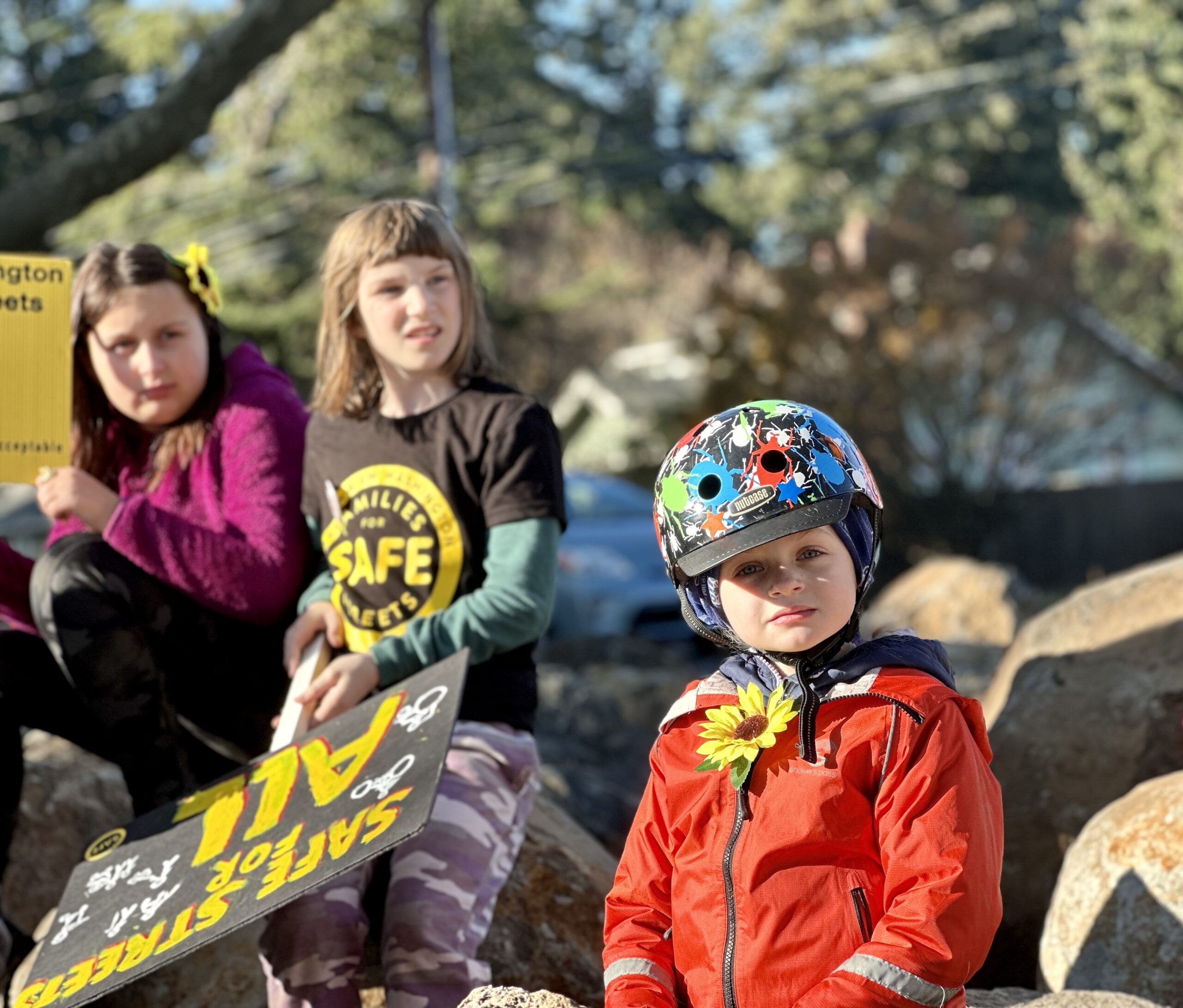
“Every day I think about the simple crosswalk improvements that could have prevented the crash.”
-Michelle DuBarry
Behind every faceless statistic on Portland’s traffic crash fatality report is a real person whose future was shattered in the blink of an eye, leaving their family and friends with a hole in their lives that can never be filled. This isn’t always obvious in traffic crash news reports, which can be impersonal and often chalk up the tragedy to an “accident” carried out by an inanimate object.
At yesterday’s World Day of Remembrance for Road Traffic Victims event in Portland, advocates pushed to move the needle on how people understand and act on road violence. About three dozen people gathered in outer southeast Portland near the intersection of SE Powell and 122nd Ave to hear from local leaders and people who have been directly affected by traffic violence.
In their speeches, they challenged the idea that changing the car-dominant status quo on our streets requires too much money or that it’s impacts would be too uncomfortable for people who drive cars. How could any of that be more unimaginable than losing a child?
The event was organized by members of the local Families for Safe Streets chapter, in collaboration with advocacy groups The Street Trust, BikeLoud PDX and Oregon Walks. Michelle DuBarry, Darla Sturdy and Kim Stone — three street safety advocates who lost children in traffic crashes — stood at the front of the group. They held photos of their children who were killed: Seamus DuBarry, who was just a year old when he died after being struck by a careless driver in north Portland in 2010; Aaron Wagner Sturdy, who was 16 when he was struck and killed by a MAX train while biking across light rail tracks in Gresham in 2003; and Joe Stone, who was 25 when he was hit and killed by an SUV driver while trying to walk at a crosswalk on outer Division Street in 2008. There are too many more of these names and stories.
DuBarry spoke first. She was accompanied by her young twins Gus and Greta, who sat beside her holding signs that said “safe streets for all” and “change your ways, ODOT.” Gus and Greta were born after Seamus was killed, but DuBarry and her husband keep his memory alive by telling their kids about the sibling they lost.
“They only know their brother through photos and the stories that we share about him,” Dubarry said. “They never met him because a driver struck him in a crosswalk on Lombard Street in north Portland.”
Lombard is one of several “orphan highways” in Portland — former state highways that now function as neighborhood streets but have not been treated accordingly by their owners, the Oregon Department of Transportation. ODOT-owned roads are some of the most dangerous in the city. This includes Powell Blvd, which the event was held adjacent to so participants could hear car traffic whizzing by. Last month, a woman named Sarah Pliner was killed while trying to bike across a different stretch of Powell, an incident that sparked renewed outrage in ODOT’s management of Portland streets.
“[ODOT’s] number one priority is to move cars through quickly, not to keep kids like Seamus safe,” DuBarry said. “Every day I think about the simple crosswalk improvements that could have prevented the crash.”
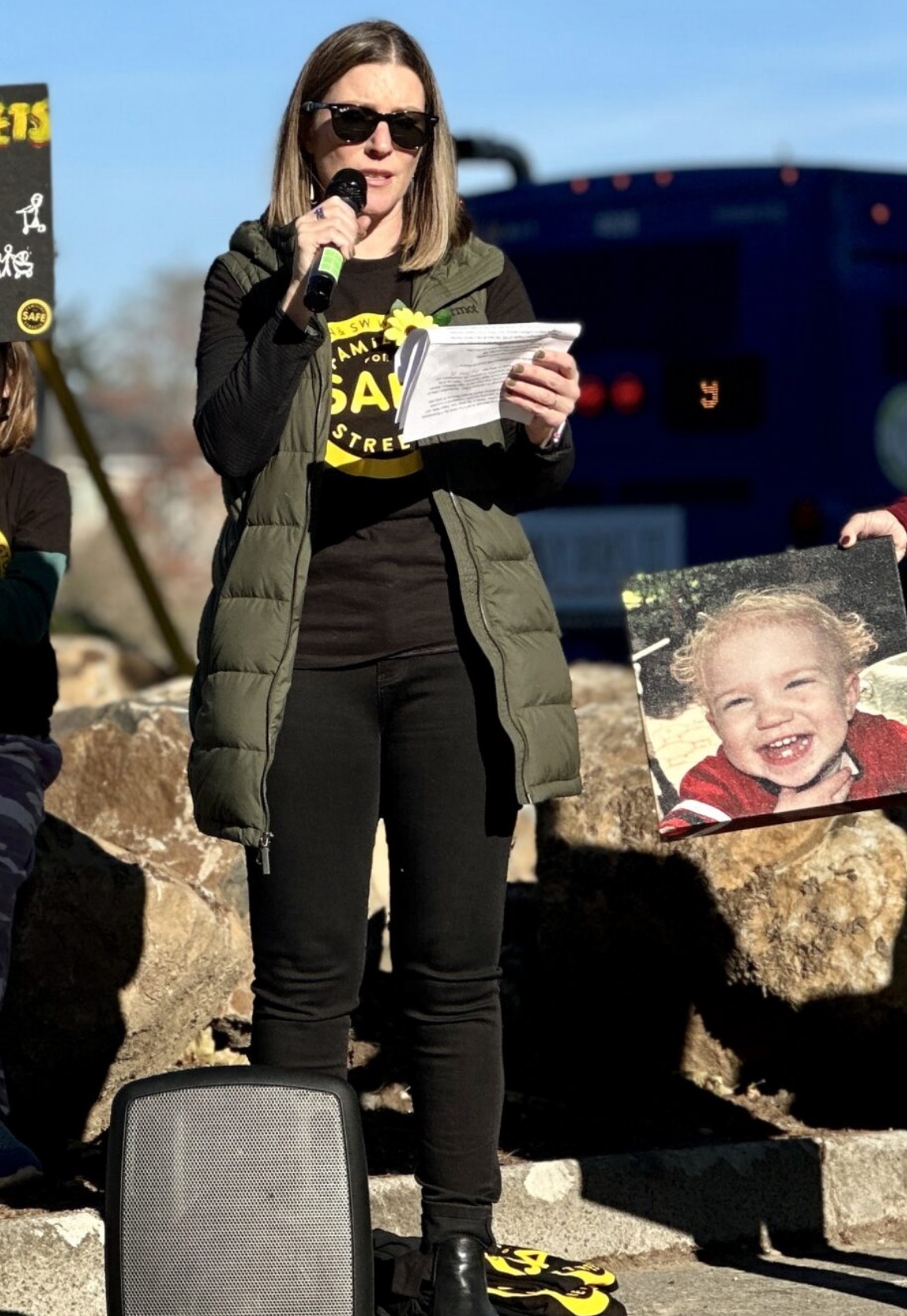
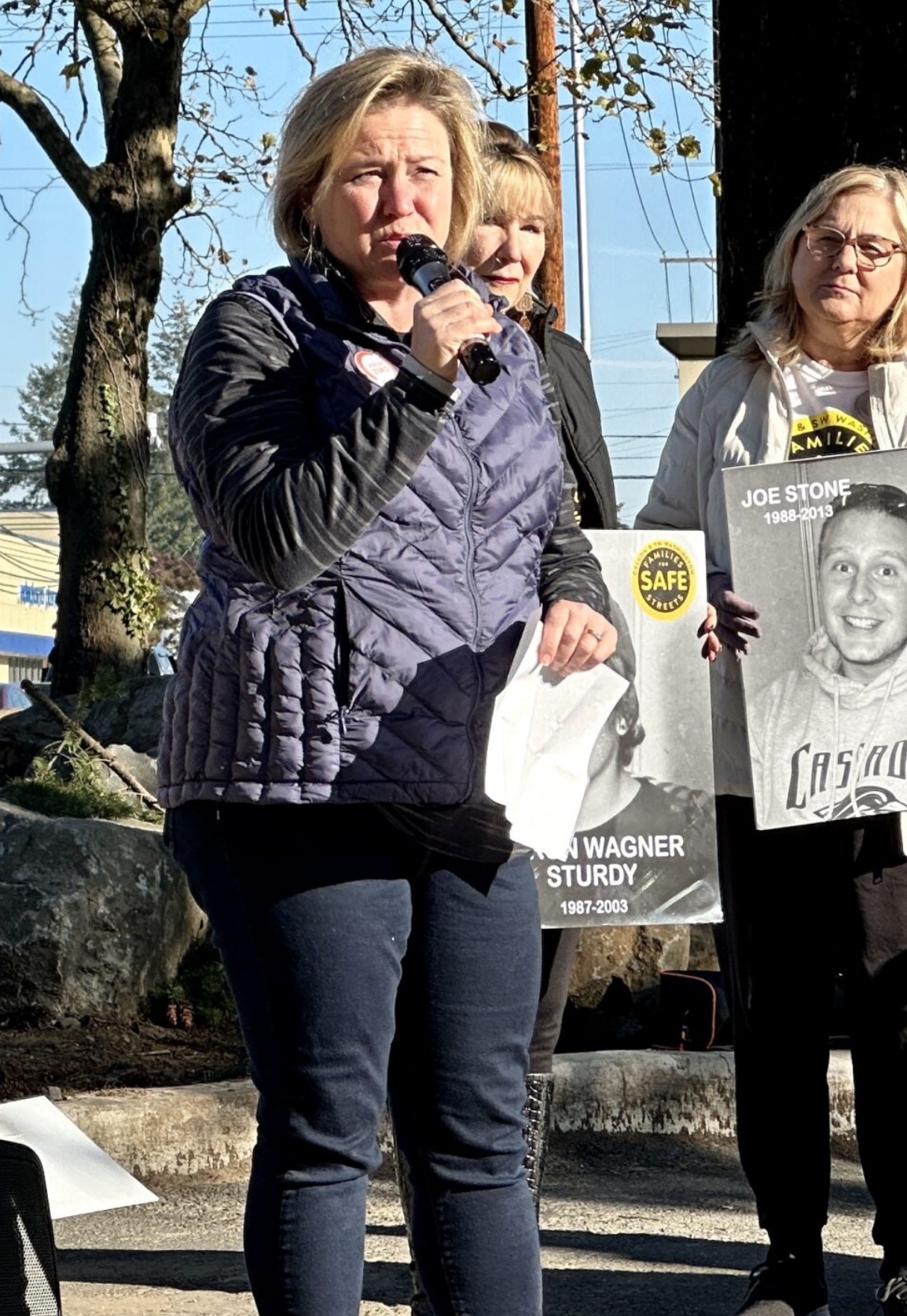

DuBarry called on ODOT to reconcile claims they can’t afford to make changes to streets like Lombard and Powell while planning to spend billions on freeway expansions.
“We are here today because ODOT’s budget priorities do not reflect the needs of our community,” she said.
DuBarry was followed by Meg Niemi, whose son Eli was hit while biking at 45th and Powell earlier this year. Eli survived the crash, but the incident still left their family reeling. Then Darla Sturdy took the mic and to talk about her son Aaron.
“It changes your life in a second. Who would imagine that your son wouldn’t come home?” Sturdy asked. “I wonder why God left me here and took my son.”
Sturdy said about four years after the crash, she got involved in activist work to push TriMet to make their light rail crossings safer and then became involved in safe streets advocacy at large. She followed a similar trajectory to many other people who have experienced unbelievable tragedy and used that as the impetus for advocacy work to try to build a world where this doesn’t happen to anyone else’s child.
“We parents work hard to help, because we know that we could still have our kids had someone just stepped up,” Sturdy said. “It can’t be about money. It’s got to be about life.”
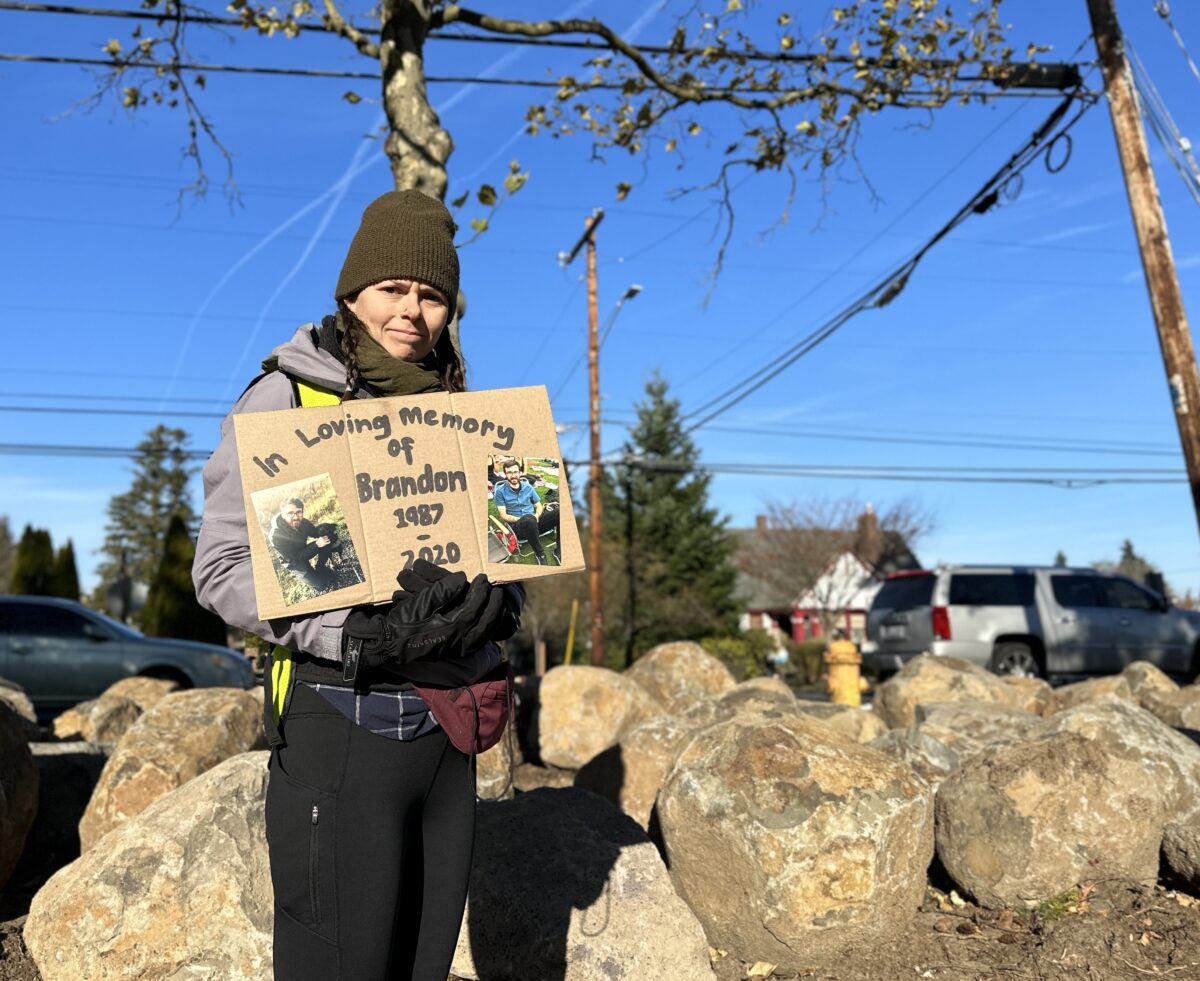

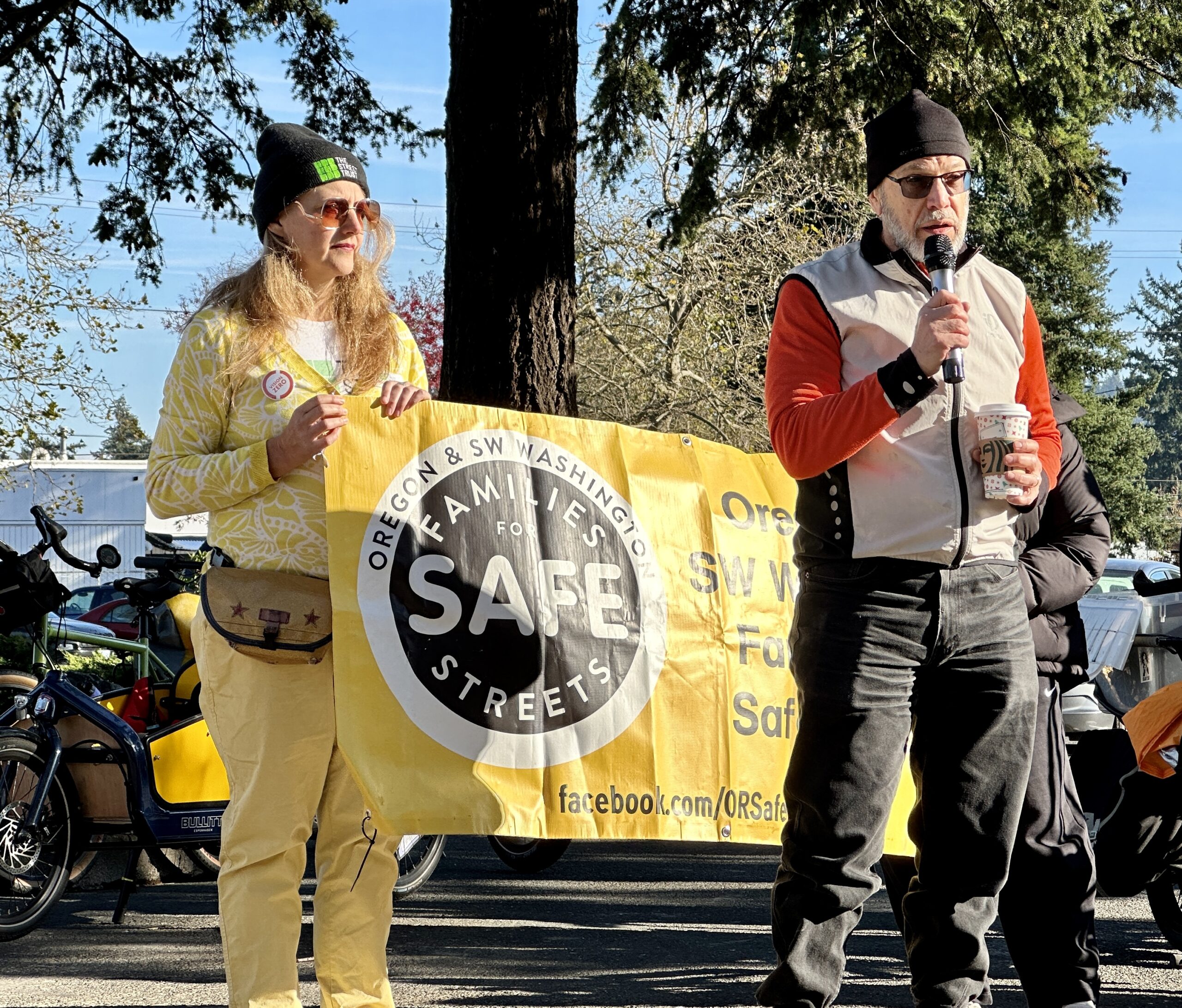
Other speakers giving personal testimony included Estelle Morley, who was hit and seriously injured after being struck by a driver while riding her bike last year, and Carolanne Fry, whose boyfriend was struck and killed while biking in 2020. Fry’s speech was particularly poignant — she hadn’t expected to speak and didn’t have anything prepared except what was in her heart.
“I’m here today because my boyfriend Brandon was killed on 148th and Powell, just a few blocks up the street, on April 14, 2020,” Fry said. “The only thing that comforts me is the hope that the ambulance person was holding his hand because I couldn’t be there with him.”
Fry said there will be a trial for the driver who hit Brandon beginning in just a few weeks. But whatever happens at the trial won’t be enough to change what happened.
“The thing about the trial that really bothers me is that no one wins. Brandon is dead. This person is probably going to prison for several years based on his criminal actions, but that doesn’t bring Brandon back and it doesn’t save this other guy’s family from what they’re going through knowing that their son killed someone,” Fry said. “The hurt that traffic violence causes, the people who are left behind…it’s just awful.”
Then BikeLoud PDX member Mark Linehan stepped up. He had been hit by a driver a few blocks from the event location while riding with the rest of the BikeLoud group. (See more about the crash here.) This was a reminder of how pervasive traffic violence is on our streets.
“I’m so sorry to hear about the people who are killed. And I must say I’m lucky that it didn’t happen to me because it could easily have done just within about the last hour,” Mark said.
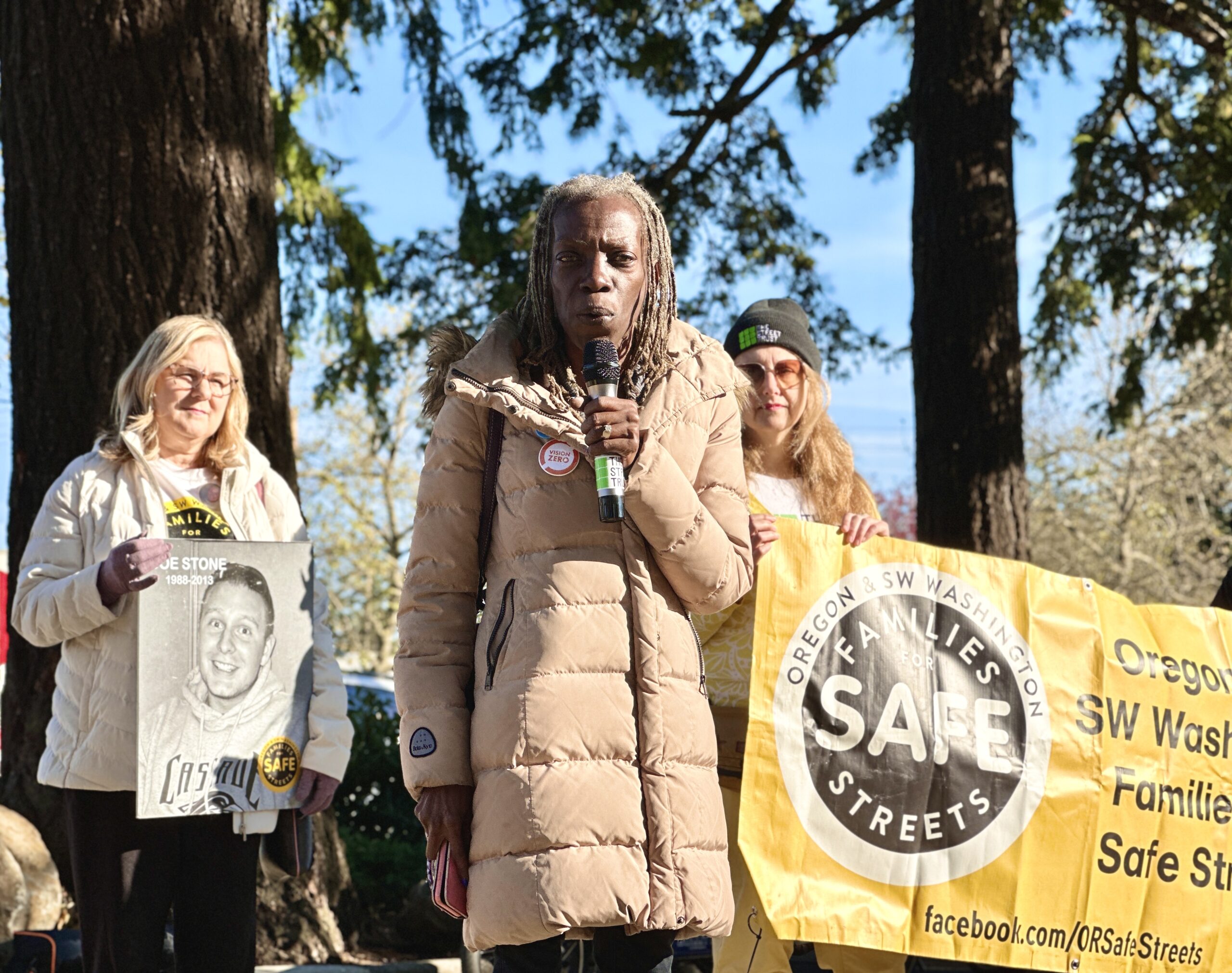
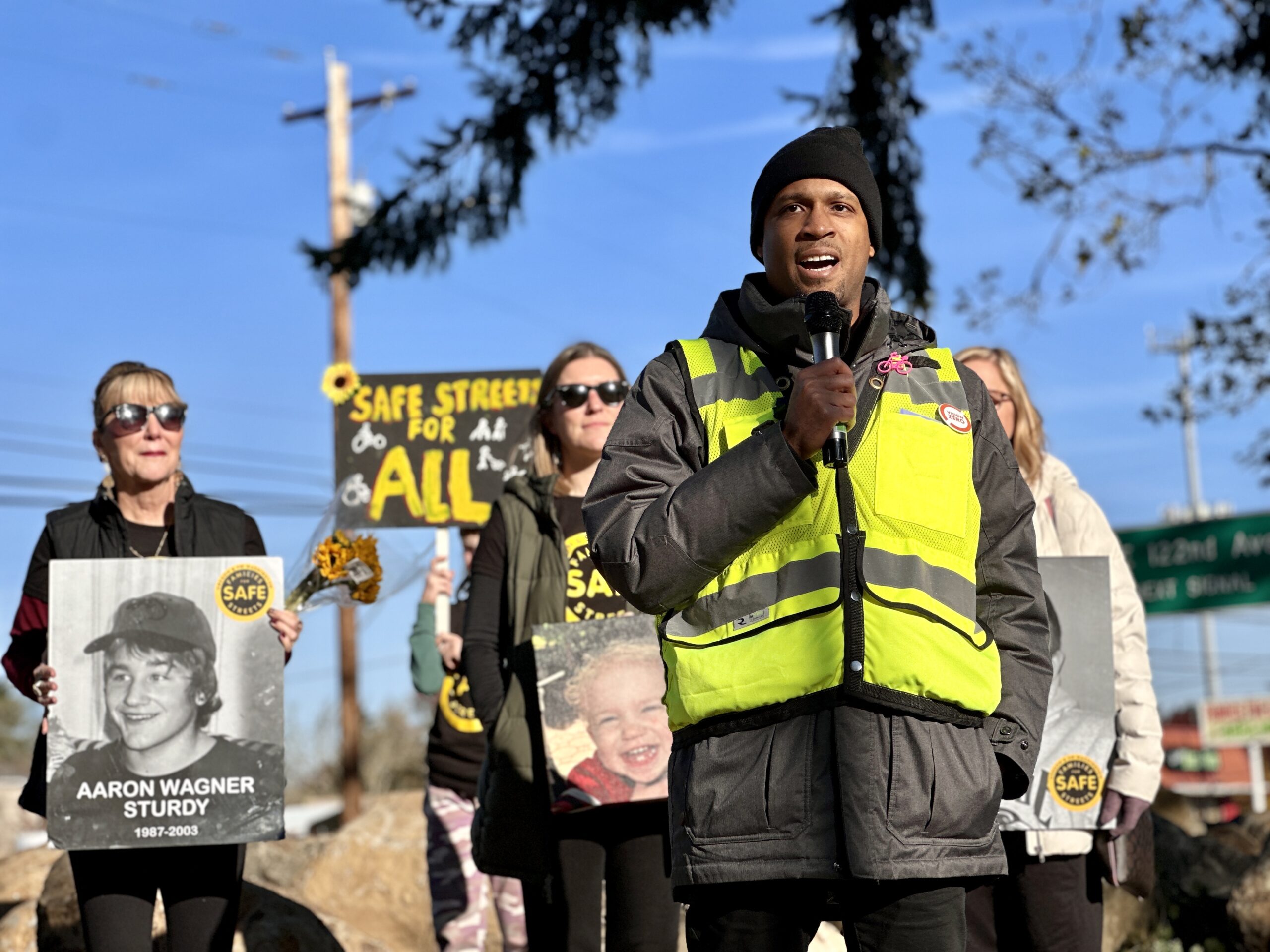
After the personal testimony, several local leaders including Portland Bureau of Transportation Commissioner Jo Ann Hardesty and incoming Metro Councilor Ashton Simpson (who currently heads Oregon Walks) addressed the group.
Hardesty spoke differently yesterday than she has at other events like this in the past. Since she wasn’t reelected to her City Council position earlier this month, she didn’t talk about her own future plans to lead traffic safety efforts in Portland and instead called on others to continue pushing leaders to act.
“I don’t want any other parent or loved one to have to show up and tell the same stories over and over and over again,” Hardesty said. “What will stop it is you showing up at Council or in Salem and demanding that traffic safety become a public health issue, because that’s what it absolutely is.”
Simpson finished the main part of the event with a rousing and candid speech.
“These families behind me and the folks that have spoken today helps hold a compelling experience that they have to live with every damn day,” Simpson said, choking up. “Not just something that we read over gloss over as everyday folks, but something they have to live with and go through and feel every day.”
“Nobody wants to hear about the slow grind and bureaucracy and doing this and doing that. They want to see things get fixed.”
– Ashton Simpson, Metro
Simpson said the most important thing local agencies can do is make infrastructure changes that prioritize people over cars.
“We can obviously see that drivers cannot be responsible enough to slow the hell down,” Simpson said, garnering cheers from the audience. “How do we fix the infrastructure so that we can control the streets and keep people safe? Isn’t that the job of the government to keep folks safe? So why aren’t we doing more of that?”
As an elected official whose first term in Metro Council is on the horizon, Simpson is in the opposite position as Hardesty, and he said he wants everyone listening to hold him accountable once he enters office.
“I’m going to be on the other side of that fence and y’all are going to be yelling at me to fix things and I’m going to be yelling at [other leaders] to fix things. Because guess what? It takes intentionality. It takes urgency to get these things done,” Simpson said. “Nobody wants to hear about the slow grind and bureaucracy and doing this and doing that. They want to see things get fixed.”
After Simpson’s speech, the group went on a walk down Powell across 122nd Ave to experience what it’s like to walk at the intersection of two of the most dangerous streets in the city. Along the way, we heard drivers rev their engines for no apparent reason, sometimes yelling out the window just at the sight of a group of people standing near the street. From these experiences, it’s abundantly clear how impermeable car culture is on our streets, especially in east Portland.
Despite these huge challenges, participants seemed to leave the event with a feeling of hope. The people who have lost loved ones due to traffic violence have been able to find a future in each other and the work they do to make the world a better place. Hearing testimony from people who have been through hell and are still standing, still giving voice to their truth and tragedy, should give us all momentum to keep up the fight for safer streets.
“We have the solution. Other cities have solved the problem of traffic violence. We need our transportation leaders to act…to treat this crisis with the urgency it demands,” DuBarry said. “So thank you again for being here and for demanding accountability and action.”
More photos below:
